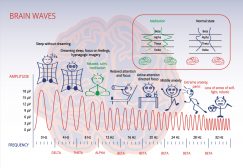Definition
noun
A programmed cell death characterized by biochemical events leading to self-digestion through the destructive action of enzymes produced by the cell itself, often as a defensive or self-preservation response
Supplement
The death of a cell may be physiological (i.e. programmed cell death) or non-physiological (i.e. necrosis). In the former, it is described as physiological because the death of the cell is mediated by an intracellular program.1 The programmed type of cell death is further categorized into type I cell death (or apoptosis) and type II cell death (or autophagy).
Autophagy is the process involving biochemical events catalyzed by enzymes produced within the cell that leads to self-digestion. The organelles and misfolded proteins become contained inside a vesicle (referred to as autophagosome). They are then directed into the lysosomes for degradation. Thus, autophagy is a means of the cell to maintain intracellular homeostasis. Not all autophagy ends in cell death. In this case, the cell may still survive. Nevertheless, there are also instances wherein autophagy leads to cell death, such as in the case of a cell that has become cancerous and evaded apoptosis.
Also called:
- type II cell death
- auto-cannibalism
- autophagocytosis
Compare:
See also:
- programmed cell death
- cell death
- cell cycle
- Necrosis
- Cancer bodies
- Lysosome
- Senescence
- autophagosome
Reference(s):
1 Engelberg-Kulka H, Amitai S, Kolodkin-Gal I, Hazan R (2006). “Bacterial Programmed Cell Death and Multicellular Behavior in Bacteria”. PLoS Genetics 2 (10): e135.







